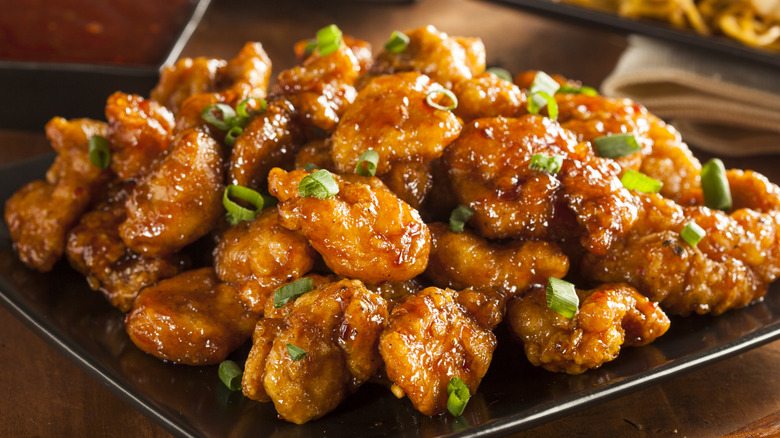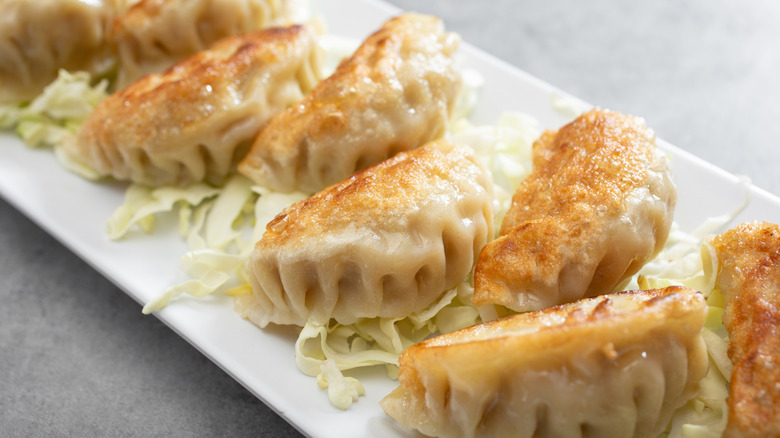Frozen Chicken Recalls That Affected Millions
The frozen chicken market in the U.S. is huge. In fact, research suggests that in 2023, it was worth more than $148 billion, and by 2032, it could exceed $240 billion. Grocery store freezers all over the country are stocked with frozen nuggets, tenders, patties, and many pre-prepared frozen meals with chicken, too. But while frozen chicken products often offer ease and convenience, sometimes they can be dangerous.
As with many other industries — like ground beef and ice cream, for example— frozen chicken products are not immune from contamination with things you really don't want in your dinner. We're talking pieces of metal wire, hard bits of plastic, small rocks, and even bacteria, like listeria and salmonella. And on top of this, sometimes frozen chicken brands fail to declare when their products contain serious allergens, like wheat, egg, and shellfish.
This all sounds a little scary, but it's important to highlight that when these issues come to light, many companies and brands act very quickly to recall affected products from the market. Below, we've covered some of the biggest frozen chicken recalls of recent years — from small companies and industry giants alike.
Perdue Foods recalled more than 167,000 frozen chicken nuggets and tenders as they may contain metal (2024)
Perdue Foods is one of the biggest chicken suppliers in the U.S. Its parent company Perdue Farms —which was founded back in 1920 — is worth more than $10 billion. So it's safe to say, this brand produces a heck of a lot of chicken products. But it is not immune from controversy. In the last few years, Perdue Farms has faced allegations of child labor violations, animal cruelty, and unhygienic conditions for animals. Plus, in 2024, it was forced to recall more than 167,000 of its frozen chicken nuggets and tenders over fears they could contain metal.
At the time of the recall, the products had already been shipped nationwide. The issue came to light when Perdue Foods started to receive complaints from consumers that they had found metal wire inside of their nuggets and tenders. In a statement addressing the recall, Perdue's senior vice president of food safety and quality, Jeff Shaw, said in a statement that the wire had been "inadvertently introduced into the manufacturing process."
Often, metal finds its way into food products when pieces of machinery used in production break off. If consumed, metal can pose a serious risk to health; it can cause internal injuries, dental injuries, and potentially lead to choking. Luckily, there were no injuries associated with the Perdue recall, which is now closed.
Canadian food importer recalled more than 2,000 pounds of frozen chicken kebab amid Listeria fears (2024)
Foreign objects, like metal, are a common reason for food recalls, but another common reason is microbial contamination. Sometimes, dangerous food-borne bacteria, like E.Coli and salmonella, can find its way into the food system and lead to illness. But they're not alone, another leading cause of food-borne illness is listeria.
This bacteria, which can lead to listeriosis — an infection that is often mild but can be serious and even fatal for vulnerable individuals — has led to a number of recalls in the food industry. In July 2024, for example, Al-Safa U.S. — a Canadian importer of halal meat products — was forced to recall more than 2,000 pounds of frozen chicken kebab over fears they could contain Listeria (full name Listeria monocytogenes).
There were no reports of illness associated with the now-closed recall. The bacteria was found during routine testing by the USDA Food Safety and Inspection Service (FSIS), which encouraged any consumers who had already bought the products to throw them away or return them to stores for a refund. Al-Safa US isn't alone. Also in 2024, New York brand Boar's Head recalled more than 7 million pounds of deli meat as it was contaminated with listeria. The outbreak led to 61 cases of illness and 10 deaths.
Conagra Brands recalled more than 245,00 pounds of frozen chicken strips due to possible plastic contamination (2023)
From whipped cream (via Reddi-Whip) to plant-based meat (via Gardein), Conagra Brands produces many different products. But in 2023, this food giant got into hot water over some chicken strips produced by frozen meal brand Banquet Foods, another of its subsidiaries. Some strips included in the product Banquet Chicken Strips Meal were found to contain small pieces of plastic.
The FSIS discovered the problem when it saw a consumer complaint stating that they had received an injury in their mouth from consuming one of the contaminated products. Like metal, pieces of plastic sometimes find their way into food products during manufacturing. As well as potentially leading to oral harm, they are also a choking hazard.
To try and reduce the risk of any further injuries, Conagra Brands issued a recall for more than 235,000 pounds of the frozen chicken meals. They encouraged anyone who had already purchased the products to throw them away or return them for a refund. There were no further reports of injuries associated with the products.
This is not the first time Conagra Brands has had to recall products due to metal contamination. In 2021, the company voluntarily recalled Broccoli Tots made by Bird's Eye amid concerns they contained metal fragments and small rocks. Before the recall was issued, the company was informed that two consumers had received dental injuries from consuming the product.
Whitson's Food Service recalled more than 8,700 pounds of frozen chicken meals due to undeclared egg (2023)
Also in 2023, New York brand Whitson's Food Service issued a recall for more than 8,700 frozen chicken Alfredo and chicken pasta meals as they contained eggs that had not been declared on the packaging. At the time of the recall, the frozen chicken meals from Whitson's Food Service had been shipped to a number of institutions across New York and Pennsylvania, including schools.
Shipping to schools was particularly problematic as egg is a common allergen for children in the U.S. In fact, it is the second most common allergen in young people after cow's milk. It is also one of the most common foods to cause anaphylaxis in children. Anaphylaxis is a severe allergic reaction that causes the airways to narrow and the body to swell, which can be life-threatening.
That said, most cases of egg allergies are mild. Symptoms can include everything from nasal congestion (think runny noses and sneezes) to feeling sick. One of the most common reactions to eggs, however, is hives and inflammation. There were no reports of serious reactions associated with the Whitson's Food Service products. However, the FSIS was alerted to the undeclared allergen via a consumer complaint.
Idaho brand recalled more than 6,000 frozen crispy chicken meals due to undeclared shellfish (2022)
Egg isn't the only allergen that has led to frozen chicken recalls. In 2022, Idaho brand Mountain View Packaging recalled more than 6,000 frozen crispy chicken meals, sold under the brand name InnovAsian, as they contained shrimp that was not declared on the packaging.
A type of shellfish, shrimp is a major allergen. In fact, shellfish is the most common allergen in the U.S., and likely affects around 2% of the population. Shellfish allergies are split into two categories: mollusks and bivalves, and crustaceans. Shrimp falls into the crustacean category, which is the most common cause of shellfish allergies. Like eggs, consuming shrimp if you have an allergy can lead to an allergic reaction. For many, reactions will be mild, but for others, this could mean anaphylaxis. As with Whitson's Food Service, there were no serious reports of illness associated with the chicken meals, however the issue was first raised to the FISIS by a concerned consumer.
Mountain View Packaging isn't the first company to have to recall products due to undeclared shrimp. In 2020, Whole Foods Market recalled popcorn chicken products from 26 stores in California and Nevada as they were mislabeled and did not list shrimp on the packaging as an allergen. At the time of the recall, one person had reported an illness associated with the products.
Foster Farms recalled 148,000 pounds of frozen chicken patties over concerns they may contain hard pieces of plastic (2022)
Similar to Perdue Farms, Foster Farms — founded in 1939 — is a leading supplier of chicken in the U.S. In fact, it is the biggest processor of poultry in the state of California. But also like Perdue Farms, it is no stranger to controversy. In the last few years, it has faced allegations of illegal water use and animal cruelty, for example. And in 2022, it was also forced to issue a major recall due to concerns its products were contaminated with extraneous materials.
Unlike with Perdue, the contaminant wasn't metal wire, but hard pieces of plastic. At the time of the recall, which covered 148,000 pounds of frozen chicken patties, the products had already been shipped to multiple Costco distribution centers across the U.S. And once again, the problem was spotted not by Foster Farms, but by consumers who found the pieces of plastic embedded in their food.
There were no reports of serious injury associated with this specific recall, but consumers have been injured by hard pieces of hidden plastic in food on other occasions. In 2023, for example, Kraft issued a major recall of its American cheese slices after six consumers reported gagging or choking on plastic in the food.
British Columbia company recalls 880 pounds of frozen chicken curry amid Listeria concerns (2022)
Also in 2022, British Columbia company Connoisseur's Kitchen recalled nearly 900 pounds of frozen chicken curry products due to concerns they had been contaminated with listeria bacteria. The Canadian company had already shipped the affected products, which were sold under the brand name Spice Mantra, to retailers in Alaska and Washington at the time of the recall.
As mentioned above, consuming products contaminated with listeria can lead to serious illness in the form of listeriosis. Serious illness is rare, but it does happen. Every year in the U.S. around 1,600 people become infected with listeria and around 260 people die from that infection, per the CDC. The most at-risk individuals include newborn babies, people with weakened immune systems, and the elderly.
Pregnant people are also at high risk from listeria. In fact, research suggests that people who are pregnant are 10 times more likely to fall ill with listeriosis, and pregnant Hispanic people are 24 times more likely. As well as illness, consuming listeria when pregnant can also increase the risk of miscarriage, stillbirth, low birth weight in babies, and newborn health problems. Luckily, there were no reports of serious illness associated with the Connoisseur's Kitchen recall. The bacteria was found when samples from the frozen chicken curries grew listeria in laboratory tests conducted by the FSIS.
More than 33,5000 frozen chicken and vegetable potstickers were recalled due to plastic contamination (2021)
In 2021, after complaints from consumers started surfacing, Californian brand Ajinomoto Foods recalled more than 33,5000 frozen chicken and vegetable potstickers sold under the brand name Ling Ling. The issue, according to customers who had already bought the products, was that some of the potstickers appeared to contain hard plastic.
Plastic is a common cause of food recalls largely because hard pieces present an injury risk and a choking hazard. But plastic in our food is also a chronic health risk, too. Consuming the material — which is prolific in the food system thanks to microplastics — has been linked with an increased risk of cancer and reproductive health issues. Luckily, no consumers reported injuries or issues from accidentally consuming the products from Ajinomoto Foods. Anyone who had bought the products was encouraged to throw them away or return them to the store they bought them from for a refund.
Serenade Foods recalled more than 59,000 pounds of frozen chicken over Salmonella fears (2021)
In 2021, Indiana brand Serenade Foods recalled more than 59,000 pounds of frozen stuffed chicken products, sold through brands like Dutch Farms, Milford Valley, and Kirkwood, due to concerns it contained food borne bacteria. This time, it wasn't listeria that was the culprit, but salmonella. At the time of the recall, the products had already been shipped to stores across the U.S.
Salmonella is a leading cause of food-borne illness. In fact, cases of salmonella infection dwarf those of listeria. Every year in the U.S., the bacteria contributes to around 1.35 million illnesses. Around 26,500 of people affected will need to be hospitalized, and around 420 will die from the infection, notes the CDC.
Unfortunately, the products from Serenade Foods did cause illness. The contamination came to light when public health organizations in the U.S., including the FSIS, began investigating cases of salmonellosis (the intestinal disease caused by salmonella) in eight different states. Eventually, the organizations traced the bacteria back to Serenade Foods. The symptoms of salmonellosis include diarrhea, cramps, and fever. For most, they will clear up in less than a week.
Salmonella has been the cause of many major food recalls. In 2011, for example, meat giant Cargill was forced to recall a whopping 36 million pounds of ground turkey meat due to salmonella contamination. More recently, in 2024, more than 10,800 packs of eggs were recalled from Costco stores due to the bacteria.
Conagra Brands recalled more than 276,000 pounds of frozen chicken and turkey over concerns they contained small rocks (2020)
Plastic isn't the only extraneous material that has snuck into products produced by Conagra Brands. In 2020, the company had to recall more than 276,000 of frozen chicken and turkey bowl products from its brand Healthy Choice over fears they contained small rocks. At the time of the recall, the bowls had already been shipped across the U.S. and to Canada. Again, the issue came to light when consumers started complaining of finding the rocks in their food.
Conagra Brands isn't the only company to be caught out by hidden rocks. In fact, small rocks are a common cause of recalls, as they often get into the food supply when raw ingredients are harvested from the ground, which, of course, contains rocks, gravel, and pebbles. Sometimes, bugs can make their way into food products this way, too. In the past, Trader Joe's has also had to remove products from the shelves after consumers found rocks inside pre-prepared pilaf meals and cookies.
Hidden rocks and plastic pieces aren't the only reasons why Conagra Brands has had to issue recalls. In 2023, the food giant was forced to recall more than 2.5 million cans of meat and poultry due to a packaging defect that caused some of them to spoil and leak.
Perdue Foods recalled nearly 500 pounds of frozen chicken due to undeclared allergens (2019)
The metal wire incident was not the first time Perdue Foods has had to recall products. In September 2019, the brand issued a recall for nearly 500 pounds of frozen chicken tenders because they contain undeclared wheat.
Undeclared wheat is a serious problem for many consumers. It is one of the most common allergens in children, for example, and, as with egg and shrimp, consuming it unknowingly could lead to an allergic reaction (again, including, in rare cases, life-threatening anaphylaxis). But on top of this, wheat is also a risk for those with celiac disease. Research suggests around 1% of the U.S. population suffers from the disease, per Beyond Celiac, which is a chronic autoimmune condition triggered by gluten (one of the proteins found in wheat), with symptoms like diarrhea, fatigue, nerve damage, indigestion, constipation, and weight loss.
Once again, Perdue Foods was alerted to the problem after the products had already been distributed — this time to retailers in Florida, Georgia, North Carolina, Ohio, and Pennsylvania. There were no reports of serious reactions associated with the recall.











